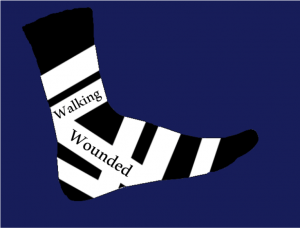Abstract:
What happens to clinicians when caregiving becomes reduced to metrics of productivity?
This piece is a podcast episode that covers some of the factors leading to burnout among mental health professionals. In my discussions with mental health professionals across the Houston area and a former social worker, I noticed a general consensus on community mental health agencies, in particular, being settings that make mental health professionals likely to experience burnout.
In an attempt to understand the roots of burnout among clinicians in community mental health agencies, this episode captures the perspectives of mental health professionals who have either left community mental health centers or are currently working in such centers. From my interviews, I found the major thread connecting the factors that likely lead to burnout is the emphasis on productivity. Interestingly, productivity-driven rules aim for efficiency, a stark contrast to the provision of meaningful care and a burdening detriment to the mental health clinician’s well-being.
Further, some clinicians feel that burnout tends to suggest an individual fault, an individual deficiency, instead of capturing the whole narrative behind clinician exhaustion and stress. Needless to say, burnout also stems from institutional designs, from how care and the clinician are valued in an institution.
In this discussion of burnout, mental health professionals are uniquely posed in that they both treat and are vulnerable to issues such as burnout. Through this podcast, I hope to also convey the emotion behind the commentary of the mental health clinicians as they discuss a topic that is not always comfortable to discuss. Mental health professionals featured on this podcast include a licensed professional counselor currently working in a community mental health center, a social worker who left community mental health centers, and a former social worker turned writer.
Walking Wounded
Transcript: https://docs.google.com/document/d/1HCd4Jt40taKqCN-GvECBQI47wbLzO_Joqta8ilnLBwg/edit?usp=sharing
References:
Asken, Michael. “It’s Not Moral Injury: It’s Burnout (or Something Else).” Medical Economics, June 7, 2019. https://www.medicaleconomics.com/view/its-not-moral-injury-its-burnout-or-something-else.
Dean, Wendy, Simon Talbot, and Austin Dean. “Reframing Clinician Distress: Moral Injury Not Burnout.” Federal practitioner for the health care professionals of the VA, DoD, and PHS 36 (September 2019): 400–402. https://www.ncbi.nlm.nih.gov/pmc/articles/PMC6752815/.
Epstein, Ronald M. “What’s the Opposite of Burnout?” Journal of General Internal Medicine 32, no. 7 (2017): 723–24. https://doi.org/10.1007/s11606-017-4034-x.
Hannah Foshee, Interview with Sujay Marisetty, November 2020.
Horton, Anisa. “How Burnout Affects Mental Health Workers.” BBC, March 6, 2020. https://www.bbc.com/worklife/article/20200305-how-burnout-affects-mental-health-workers.
Jenni Musick, Interview with Sujay Marisetty, October 2020.
Seth, Shivani. “Does Anyone Care About the Mental Health of Social Workers?” Healthline, October 29, 2019. https://www.healthline.com/health/mental-health/social-workers-mental-health#1.
Shivani Seth, Interview with Sujay Marisetty, November 2020.
Wible, Pamela. “Not ‘Burnout,” Not Moral Injury-Human Rights Violations.” Pamela Wible MD, March 18, 2019. https://www.idealmedicalcare.org/not-burnout-not-moral-injury-human-rights-violations/.
